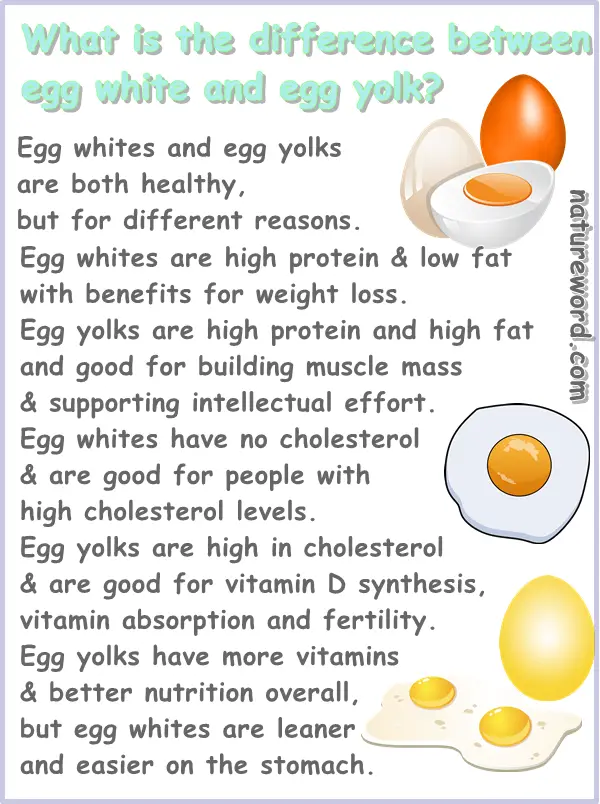What is the difference between egg white and egg yolk? It’s become common knowledge that egg white is healthier than egg yolk, and whole eggs too, and should be the preferred choice at all times. But just how healthy is egg white compared to egg yolk and what makes egg white so good for you vs egg yolk? Discover what is the difference between egg white and egg yolk and choose which of the two is better for you in terms of nutritional value and health benefits.
Egg white or egg yolk: which is better?
Which part of the egg is healthier: egg white or egg yolk? There is this widespread misconception that egg white is healthier than egg yolk because egg white is the high protein, fat free and cholesterol free part of the egg. And it’s not just that eating egg white is better for you than eating egg yolk, or whole eggs, but eating egg yolk, or whole eggs, has actually become bad for you. But egg yolk shouldn’t be vilified so easily. Nutritional facts demonstrate that the egg yolk is the part of the egg that carries most of the nutrition of the egg, and it’s actually even higher in protein than egg white.

What is the difference between egg white and egg yolk?
Egg white vs egg yolk nutrition differences
The difference in nutrition between egg white and egg yolk is compelling. The egg white is naturally high in protein, low in calories, very low in carbohydrates and almost fat free and cholesterol free. The egg yolk on the other hand is naturally high calories, high in fat, high in cholesterol and, at the same time, high in protein and very low in carbs.
Another big difference between egg white and egg yolk is that egg yolks carry most of the nutritional value of the egg.
More exactly, egg yolk nutrition is characterized by a high content of vitamin A, vitamins B2, B5, B6, B9 and B12, choline and vitamins D and E. Egg yolk is also naturally high in iron, selenium, phosphorus and zinc, and contains smaller amounts of almost all other essential vitamins and minerals. Not just this, but nutritional values for egg yolk are relevant enough to bring important contributions to daily nutritional requirements.
By comparison, egg white nutrition is poorer. More exactly, egg white is high in selenium and vitamin B2, in addition to protein, and has a good content of natural sodium. And that’s about it. However, its low carb, cholesterol free and almost fat free nutritional profile does account for many of the benefits of eating egg whites, as does its high protein content.

Egg white vs egg yolk calories
How many calories in egg white? Egg white is the part of the egg that is naturally low in calories, with an energetic value of only 53 to 55 kcal (kilocalories) per 100 grams of egg white, roughly the equivalent of 3 egg whites from 3 medium sized chicken eggs.
How many calories in egg yolk? By comparison, egg yolk is the part of the egg that is high in calories, with an energetic value of 322 to 328 kcal (kilocalories) per 100 grams of yolk. But since the yolk is just one third of the whole egg, it takes up to 5 or 6 egg yolks from medium sized chicken eggs to reach a serving of 100 grams.
Egg white vs egg yolk protein content
How much protein in egg white? There are 10 to 11 grams per 100 grams of egg white. How much protein in egg yolk? There are 15.8 to 16 grams of protein per 100 grams of egg yolk. Both parts of the egg have quality protein that contains all essential amino acids, and a few non-essential ones.
Is there more protein in egg white or egg yolk? There is more protein in one egg white than in one egg yolk: 3.6 g of protein per one egg white vs 2.7 g of protein per one egg yolk. But that’s just because the egg white is bigger than the egg yolk. When comparing equal amounts of egg white and yolk, there is actually more protein in egg yolk than egg white.
Egg white vs egg yolk fat content
How much fat in egg white? There are about 0.17 grams of fat per 100 grams of egg white, which makes egg white under 0.2% fat. More exactly, about 3 egg whites from chicken eggs provide less than 0.2 grams of fat. Almost all of the fat content in eggs is housed in the egg yolk.
How much fat in egg yolk? There are 26.5 to 28.8 grams of fat per 100 grams of egg yolk. Also, egg yolks have both unsaturated and saturated fat. Fat profile of egg yolk: 9.55 grams of saturated fat, 11.7 grams of monounsaturated fat, 4.2 grams of polyunsaturated fat. Despite the high fat content, and presence of both healthy unsaturated and less healthy saturated fats in the yolk, there are many benefits to eating egg yolk.
Egg white vs egg yolk cholesterol content
How much cholesterol in egg white? Egg white is naturally cholesterol free which is just one of the many benefits of eating egg whites. How much cholesterol in egg yolk? There are 1085 milligrams of cholesterol per 100 grams of egg yolk. But there are just as many benefits of egg yolks that can be attributed to cholesterol itself, including synthesis of vitamin D from sunlight exposure, synthesis of hormones for better fertility and insulation of nerve cells for nervous system health.
Egg white vs egg yolk carbohydrate content
Both egg white and egg yolk are low in carbohydrates. The difference is egg whites are lower in carbs than egg yolk, despite being the bigger part of the egg. How many carbs in egg white? There are on average 0.73 grams of carbs in 100 grams of egg whites, 0.71 grams of which are sugars. Just one egg white at an estimated weight of 33 grams has only 0.24 grams of carbs, 0.23 grams of which are sugars.
How many carbs in egg yolk? There are on average 3.59 grams of carbs in 100 grams of egg yolk, 0.56 grams of which are sugars. Just one egg white at an estimated weight of 17 grams has only 0.61 grams of carbs, 0.095 grams of which are sugars.
Which part of the egg is healthier?
There are benefits to eating both egg whites and egg yolks, the difference being the benefits are different. Depending on what your dietary requirements for various nutrients are, and potential dietary restrictions caused by existing conditions, you may benefit more from eating either one part of the egg, or the other.
Of course, there are instances when either the egg white or the egg yolk, or both parts of the egg are bad for you. For example, egg proteins from both egg whites and egg yolks are common allergens and cause allergic reactions with the potential for anaphylactic shock. If you are allergic to eggs, avoid them in all forms and preparations. Some people may be allergic to specific proteins in egg white, and some to specific proteins in egg yolk. Either way, if something is a source of side effects for you, remove it from your diet and substitute it with other foods that provide the nutrition you need without the side effects.
Conclusion
The difference between egg white and egg yolk is not that one is healthy and good for you and the other not so healthy or bad for you. Both egg white and egg yolk are healthy and good for you, so long as you eat them in reasonable amounts, in accordance to your individual nutritional requirements, and choose to cook them in a way that is healthy.
Indeed, egg white and egg yolk have different nutritional profiles, with notable differences in energetic value, fat content, cholesterol content, protein content per egg white vs yolk, and content of essential vitamins and minerals. And together they are a source of complete nutrition. But should you want or need to get more of specific nutrients in your diet, or less, you have the option to eat either one part of the egg or the other. Seen as they provide different nutrition, at least one is sure to help you with your nutritional requirements.
